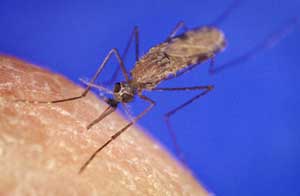Demeter: Early warning system for malaria epidemic
Scientists now have a more effective early warning system about the spread of malaria. This system uses specialized European computer programs to study weather conditions.
This new malaria warning system, called Demeter.

Mosquitoes are intermediaries for spreading malaria (Photo: VNN)
Scientists say the system will help countries with many people with malaria predict weather for months. The computer system will synthesize data on sea warming, surface temperature of the sea, wind and rainfall.
Scientists have introduced this new system in a report published in Nature.
Scientists tested this system with weather information in Botswana, Africa, from 1982 to 2002.
This computer model gives the most effective results in forecasting years of low malaria transmission. Scientists say the Demeter system predicts 85% correctly during that time.
This work was jointly undertaken by British, American and Botswana scientists.
Heart researcher Palmer, head of a research team in the UK, works at the European Center for Mid-Range Meteorological Forecasting, arguing that this system helps health officials have plenty of time. more to introduce measures to limit the spread of malaria.
A number of other early warning systems are used in many places where Africa only foresees a few weeks to prepare.
Having more time to prepare preventive measures means providing people with antimalarial and insecticide-treated nets timely. In addition, it also helps people have more time to level up stagnant pools where mosquitoes often give birth.
This Demeter system is currently being used to help some countries in southern Africa.
Scientists say more accurate weather forecasts will help those in charge of the health sector have more time to prepare for outbreaks once they get off the ground. .
Climate changes and rainfall play a role in the spread of malaria. Normally, after the heavy rains often increase the risk of disease.
The parasite that causes malaria is spread by mosquitoes. Mosquitoes lay eggs in the water, so where the more water there is, the more insects this place has to multiply.
The World Health Organization (WHO) says more than 1 million patients die from malaria every year, most of them children from African countries, and hundreds of millions of others suffer from the disease. .
- Satellites help predict malaria early
- Predicting malaria epidemic thanks to sea temperature
- India's most modern airborne early warning and control system
- Japan's new
- Indonesia developed a tornado early warning system
- Extend the tsunami warning system function
- July: an early warning system appears for South Asia
- How to diagnose, treat and prevent malaria
- China built an early earthquake warning system in Sichuan
- Mosquito-changing mosquitoes
- How does an earthquake warning system work?
- Weather warning system on the universe
 Green tea cleans teeth better than mouthwash?
Green tea cleans teeth better than mouthwash? Death kiss: This is why you should not let anyone kiss your baby's lips
Death kiss: This is why you should not let anyone kiss your baby's lips What is salmonellosis?
What is salmonellosis? Caution should be exercised when using aloe vera through eating and drinking
Caution should be exercised when using aloe vera through eating and drinking Detection of a dangerous West African mosquito capable of causing malaria
Detection of a dangerous West African mosquito capable of causing malaria  New type of bed net can paralyze mosquitoes
New type of bed net can paralyze mosquitoes  Antiquity 'cure' for ancient Romans
Antiquity 'cure' for ancient Romans  A drug is expected to turn human blood into a toxin with mosquitoes
A drug is expected to turn human blood into a toxin with mosquitoes  'Aggressive' drug-resistant malaria parasites spread throughout Southeast Asia
'Aggressive' drug-resistant malaria parasites spread throughout Southeast Asia  The fungus kills 99% of mosquitoes in 45 days
The fungus kills 99% of mosquitoes in 45 days 